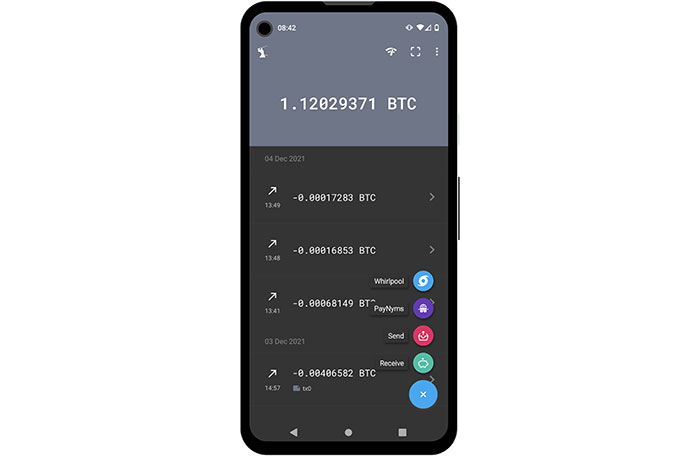A Bitcoin mixer is a type of protocol designed to increase the anonymity of Bitcoin transactions. It should be noted that a wide array of crypto mixers are available (namely, custodial as well as non-custodial) that are capable of mucking up the public history of blockchains.
In light of this, crypto mixers are ideal from a security perspective when it comes to transferring funds. The only problem with some of these protocols is their permissionless access, which may be exploited by criminals to launder illicit cryptographic assets.
In a world where complete, transparent records of all transactions can be easily found online and are easily accessible, a person can easily line them up with the amount of crypto they own and, if not that, to the name. The purpose of this is not to hide your identity or crypto portfolio. That said, it may come to that too.
What is a Bitcoin Mixer?
Originally designed a decade ago, the Bitcoin blockchain is a cryptographic protocol that offers a pseudonymous nature in its design. Although all cryptocurrency transactions, including the address of the wallet and the amount of currency moved, are public and traceable on a public block explorer, all transactions are transparent and public.
For this reason, it is only possible to use a cryptocurrency on a public blockchain anonymously when interacting with a Bitcoin mixer or other cryptocurrency mixers.

Crypto mixers help users keep their transactions private by sending the funds they want to use to a service that can mix them.
A number of Bitcoin and crypto mixer services are available on the internet nowadays, and most of them do not require KYC verification (know your customer).
In public block explorers and other sites that show the underlying transactions of cryptocurrencies, it is shown that person “A” sent funds to a Bitcoin mixer (along with hundreds of other addresses), and person “B” received funds from the Bitcoin mixer (alongside hundreds of other people). In spite of this, it would be impossible to prove who sent which crypto asset to who.
The result of this is that crypto mixers can fully anonymize cryptocurrency transactions, which as a result, provides the possibility for a dirty Bitcoin or another cryptocurrency asset to be laundered.
In addition, the words “Bitcoin mixer” and “Bitcoin tumblers” are frequently used interchangeably. But, there is a key difference between the two. It is important to understand that Bitcoin mixers provide a decentralized mixing service, whereas Bitcoin tumblers are typically offered by third parties and are centralized.
How do They Work?
As far as Bitcoin and cryptocurrency mixers are concerned, there are different types, and they operate somewhat differently. Although they work slightly differently, their basic principle is still the same.
For instance, users send an amount of the asset they want to blend. The user will then be required to set a time period before he or she is able to withdraw the amount from the mixing service.
It is important to note that coin mixing services, regardless of their operating model, usually charge a small fee to cover their profit margins and/or the cost of maintaining their protocol.

The users have the option to withdraw funds to a new wallet address when withdrawing funds. In order to ensure that certain transactional details are anonymized, some services include additional cryptographic security measures (e.g., ring signatures, zk-SNARKs) in the withdrawal transaction.
Types of Bitcoin Mixer and Cryptocurrency Mixers
Crypto mixers can be divided into two categories: custodial mixers and non-custodial mixers. Alternately, you might want to consider categorizing these services as centralized or decentralized. Both options have both pros and cons, depending on which kind of market you cater to.
In summary, users are given the option to choose between sending funds to a third-party provider or interacting with smart contract protocols via the blockchain.
Centralized
In a centralized environment, a Bitcoin mixer service is offered by a small group of people working together. It can be said that these services are in the category of “Bitcoin tumbling.” As part of the custodial service, centralized mixers also conceal users’ transactions by employing factors such as obfuscation, decoys, and obfuscation-based mixers.
As a result, users will be able to send their Bitcoin (BTC) to the Bitcoin mixer and receive different Bitcoin (BTC) for a small fee. In general, centrally managed mixers are a simple and effective way to tumble or mix Bitcoins or other crypto assets.
With the help of a trusted third party, all operational complexities and responsibilities can be handled, allowing a smooth and simple customer experience. BlindMixer is an example of one of the many popular centralized Bitcoin mixer services.
There are, however, some cons associated with centralized crypto mixers as well. For one, services provided by centralized organizations typically have higher fees than those provided by decentralized organizations.
Furthermore, there is no guarantee that the third-party mixing service will return the user’s funds afterward. The user’s funds are thus vulnerable to theft.ds, leaving the money vulnerable to theft. The mixer service itself will often keep a record that will often link the transactions associated with mixing coins together, while the public record of mixing coins will be private and anonymous.
As a result, the mixer service might reveal the connections between transactions at some point in the future.
Decentralized
In contrast to mixing providers that are centralized, it is possible to obtain a decentralized mixing service for crypto or bitcoin.
As opposed to relying on a centralized party for operation, decentralized or peer-to-peer (P2P) services run across a chain of computers (nodes) run across a network of hundreds or thousands of computers. A final advantage of P2P crypto mixers is that they provide a non-custodial service.
A mixing protocol, therefore, enables users to interact with their funds at any time; such users have access to their funds at all times.
Decentralized Bitcoin mixers have no KYC requirements and are consequently borderless and permissionless. By pooling the funds from a number of different users, the protocol is able to redistribute them in an efficient and fair manner. The most common approaches to decentralized crypto mixers are either zero-knowledge platforms (ZK) or obfuscation-based platforms (OBF).
However, the difficulty with zero-knowledge proofs lies in their cryptographic complexity, which is also a challenge when it comes to scaling the products.
As with centralized mixing services, decentralized crypto mixer protocols may assist in hiding and anonymizing the history of cryptocurrency transactions in the same manner as centralized mixing service providers.
Decentralized protocols, on the other hand, provide users with access to their funds at any given time, which, in turn, requires them to assume more responsibility on their own. Decentralized mixing services, such as CoinJoin, Wasabi Wallet, and Sparrow Wallet, are among the most popular.
Nevertheless, you need to be cautious before interacting with any crypto or Bitcoin mixer protocol. Make sure to do your own research before interacting with them.
The Best Bitcoin Mixer
To help you regain your anonymity, we’ll be taking a look at some of the best bitcoin mixers and tumblers in this section.
Samourai Wallet
Samourai is a Bitcoin wallet that was developed for privacy-conscious individuals. As a crypto wallet, you use a variety of security techniques to keep your identity private in order to “thwart blockchain-based surveillance and censorship.”
Additionally, to provide one of the safest ways for users to handle their Bitcoins, Samourai is also among the easiest to run full nodes and has a useful feature called stealth mode, which hides the wallets from your devices until you enter a secret code.
As part of the Samourai privacy enhancements, a number of techniques are employed to increase the privacy of your Bitcoin transactions. In particular, it completely eliminates the possibility of using duplicate Bitcoin addresses and also prevents inputs from merging or leaking meta-data as a result of doing so.
In addition, you also increase the length of the transaction chain with the Samourai Wallet Ricochet feature, which means the funds resulting from these transactions are much less likely to be blacklisted by centralized exchanges.
Wasabi Wallet
The Wasabi Wallet has been described by many as the game-changer for Bitcoin privacy. It is one of the few free wallet clients that genuinely enhance your privacy when using Bitcoin.
The Wasabi Wallet utilizes the CoinJoin API to combine inputs from numerous transactions into a single transaction with multiple outputs in order to achieve this. There is a type of shuffling protocol that is based on trustless shuffling that is able to obscure the payment transactions, making it very difficult to figure out who was paying who. Wasabi Wallet can be downloaded on all major desktop operating systems currently.
The Wasabi Wallet allows you to apply CoinJoin to your transactions as many times as you are comfortable with – increasing transaction privacy with each step you take.
Sparrow Wallet
The Sparrow Bitcoin wallet is software designed for those individuals who value their financial autonomy. In terms of features, Sparrow focuses on security, privacy, and usability.
It is Sparrow’s goal to not hide any information from you – rather, it tries to provide as much information as possible about your transactions and UTXOs, in a manner that is easily manageable and easy to use.
For the mixing of Bitcoin, it uses CoinJoin. The CoinJoin system allows you to maintain a large degree of privacy with a very simple yet highly effective approach. As well as Samourai Whirlpool, Sparrow contains a fully featured Whirlpool client, which includes postmix tools, making it a very popular coinjoin implementation. Alternatively, it can also be mixed directly into a cold storage wallet.
Is It Illegal To Use A Cryptocurrency Mixer?
It is a criminal offense in the United States for a person to interact with crypto mixer protocols in order to purposefully disguise their Bitcoin transaction. Probably one of the strongest arguments for this is the fact that Bitcoin’s intent is for privacy, not anonymity, and that public block explorers are auditable by the public for any chance at catching malpractice or misconduct.
According to Financial Crimes Enforcement Network (FinCEN), Bitcoin mixer services are treated as money transmitters. As a result, mixing services in the United States must apply for a license according to the state in which they wish to operate.

The illicit operations of crypto mixers have been the subject of several arrests in 2020 and 2021. Crypto exchanges have also begun blocking funds that currently show a history of mixing. Binance blocks withdrawals to Wasabi Wallet as well as refuses to accept mixed Bitcoins received through the exchange.
Conclusion
With cryptocurrency mixers, users will be able to move cryptocurrency funds anonymously between wallet addresses so that they do not lose track of their funds. Different types of Bitcoin mixer services are available, each with a different concept of operation.
In general, all crypto mixers provide the same overall service of increasing the amount of privacy and safety that can be achieved. Therefore, crypto mixers offer malicious actors ways to launder illicit funds in a more straightforward way.
It should be noted, however, that most people who use crypto mixer services do so in a legal and legitimate way.













